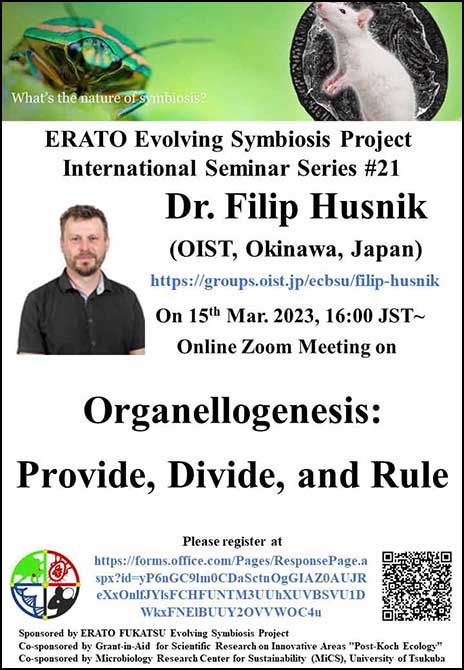ERATO Evolving Symbiosis Project International Seminar Series #21
Dr. Filip Husnik (Okinawa Institute of Science and Technology, Okinawa, Japan)
“Organellogenesis: Provide, Divide, and Rule”

Abstract: Mitochondria and plastids are the oldest known endosymbiont-derived organelles. However, describing the actual process of integration of the endosymbiont with the host (termed organellogenesis) is where we still often end up with a cart before the horse. To understand the order and importance of events through which endosymbionts transition into cellular organelles, more evolutionary cell biology data are needed on key organellogenesis events such as protein translocation system establishment, horizontal/endosymbiotic gene transfer, cell division control, and a full takeover of the symbiont’s genetic information processing (replication, transcription, and translation) by the host cell. Recent results from highly integrated insect and protist endosymbionts, i.e., non-model systems that were so far mostly characterized only with genomics data, are showing all features typical for organelles, blurring the line between endosymbionts and organelles. However, these novel systems also show that organellogenesis might follow a winding path with organism-specific outcomes. In this talk, I will present some of our recent results on highly integrated symbioses. The results improve our understanding of the transition from an endosymbiont to a cellular organelle which is central to the hypotheses about the origin and evolution of the eukaryotic cell.
ERATO Evolving Symbiosis Project International Seminar Series #21
Sponsored by ERATO FUKATSU Evolving Symbiosis Project
https://www.jst.go.jp/erato/fukatsu/english/
Co-sponsored by Grant-in-Aid for Scientific Research on Innovative Areas "Post-Koch Ecology”
https://postkoch.jp/about/
Co-sponsored by Microbiology Research Center for Sustainability (MiCS), University of Tsukuba
https://www.mics.tsukuba.ac.jp/en


